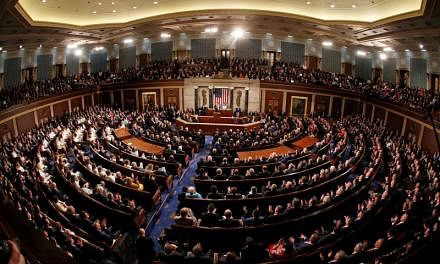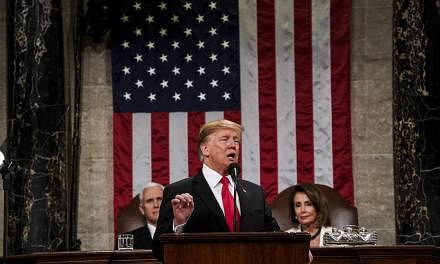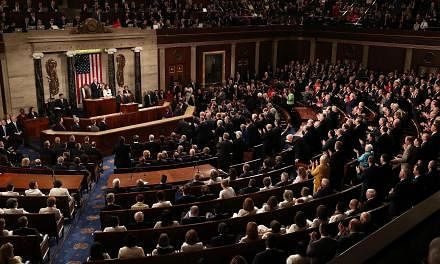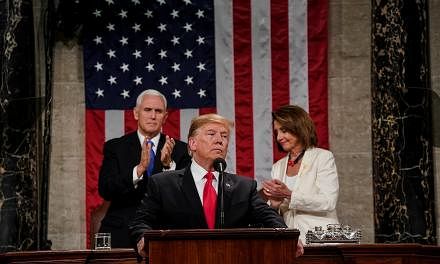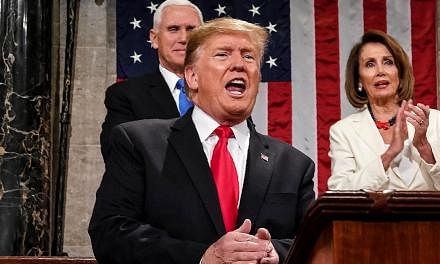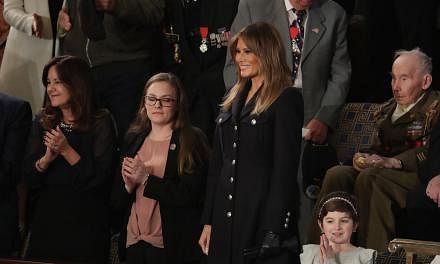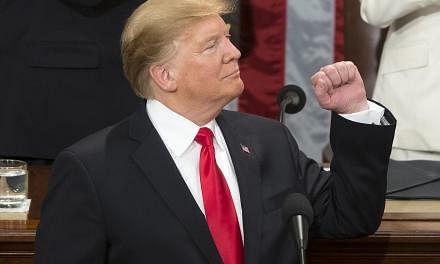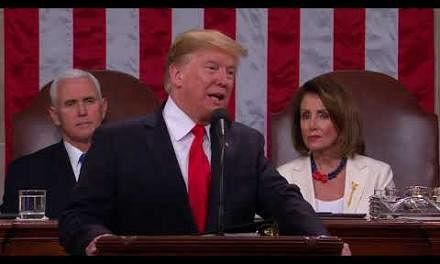WASHINGTON (WASHINGTON POST) - She smiled tightly. She pursed her lips. And, again and again, she peered down at a sheaf of papers as if to say: Is this over yet?
House Speaker Nancy Pelosi, was the face of Democratic exasperation Tuesday (Feb 5) night, sitting behind US President Donald Trump as he delivered his second State of the Union address - and his first with an opposition leader sharing the rostrum.
For the most part, Pelosi maintained an even countenance as Trump ran through both odes to partisan unity and red-meat lines such as "walls save lives" that were calibrated to needle Democrats.
On a few occasions, she was more demonstrative. When Trump declared that "America is winning each and every day," she appeared to meet eyes and chuckle with another Democrat in the audience, and when he declared a moment later that "the state of our union is strong," she gently shook her head.
At times, she served as the conductor of a Democratic orchestra - shushing lawmakers who groaned at Trump's mentions of a migrant caravan, then holding her palms in the air and urging her caucus to stand when he recognised a historic class of new women in Congress, the vast majority Democrats.
Trump, for his part, made no direct recognition of Pelosi or the new Democratic majority in his speech aside from his opening words: "Madame Speaker."
But Pelosi made an impression with her mere presence, seen by millions of Americans looking over Trump's left shoulder - an image symbolising the new reality in Washington where Democrats are poised to keep watchful eye on Trump and his administration.
"All eyes are going to be on her... to see if she can hold a poker face," Rep. Karen Bass, D-Calif., said before the speech Tuesday. "Because I know what she really would like to do would be to take the gavel and go 'boop' atop his head."
Several Democrats said they were delighted that after eight years of men at the top of the House rostrum for the prime-time address to the nation, Pelosi would be back.
She wore a suffragette-white blazer, joining scores of other Democratic women. Her attire, however, was festooned with a golden broach in the shape of the House mace - an ancient symbol of power.
"She's the mother of the country," said Rep. Lois Frankel, D-Fla., of the imagery.
Pelosi brought a fresh electoral mandate and positive new polling numbers to Tuesday's address.
A CNN poll published Monday pegged Pelosi's favourability rating at 42 per cent - her highest rating in that poll since April 2007, shortly after beginning her first four-year stint with the speaker's gavel.
Trump's approval rating in the same poll, which carried a 3.8 point margin of error, stood at 40 per cent.
Weeks after Pelosi first won the gavel in 2007, President George W. Bush paid tribute to her as the first woman to hold the position at the outset of his speech, calling it a "high privilege and distinct honour... to begin the State of the Union message with these words: Madam Speaker."
While Trump paid no tribute of his own Tuesday, he exchanged pleasantries with Pelosi upon ascending and descending the rostrum.
The two leaders are already locked in a contentious relationship due to the ongoing dispute about funding for the southern border wall that Trump promised Mexico would pay for during his 2016 campaign.
That dispute led into and played out during the recent government shutdown, during which Trump tried - and failed - to turn Democrats against Pelosi's no-negotiation strategy.
A centrepiece of the clash was the State of the Union address itself - the two leaders sparred over whether the speech would happen while the shutdown was in effect.
After the address, Pelosi made it clear that she would not back down. "Instead of fear-mongering and manufacturing a crisis at the border, President Trump should commit to signing the bipartisan conference committee's bill to keep government open and provide strong, smart border security solutions," she said in a statement.
Pelosi and her fellow House Democrats used the speech's occasion to send messages of their own - largely through the guests they invited to the House chamber for the speech.
Pelosi's guests included two active-duty transgender Army officers - an implicit critique of Trump's decision to implement a ban on transgender servicemembers - and survivors of last February's mass shooting at a Florida high school, a protest of the Republican stance against stricter gun control.
Also attending as Pelosi's guest was Leana Wen, Planned Parenthood's new president, who appeared amid a new uproar over Democratic state lawmakers' attempts to expand abortion rights in New York and Virginia.
Highlighting Democrats' position on immigration, Pelosi invited Angelica Salas, a former undocumented immigrant who now leads the Coalition for Humane Immigrant Rights of Los Angeles, and José Andrés, a Washington-based chef who has been an outspoken supporter of immigrant rights.
Other House Democrats invited a variety of Americans representing implicit criticism of Trump and his policies - including federal employees who went unpaid during the recent 35-day partial government shutdown, immigrants who are at risk for deportation due to Trump's policies, those vulnerable under potential Republican health-care initiatives and more.
Kristin Rowe-Finkbeiner, the chief executive and co-founder of the advocacy group MomsRising, said Pelosi's invitation for her to attend was "sending a strong message to the moms of American that she is listening, that what we say is important."
But she said the more profound message would be sent by the scores of Democratic women wearing white to send a message of female unity.
A few hours before the speech, Pelosi joined Democratic women for a group photo in the Capitol complex. "The unity that we're showing is that the state of our union is strong," Rowe-Finkbeiner said. "We are rising, we're coming out to town halls, we're making calls, we're speaking out to our elected officials, and we know that our country is much better than the country that Trump has been projecting."
Trump delivered his speech as congressional negotiators aim to hash out a border security spending deal that would avert another shutdown Feb 15, when the short-term measure that reopened the government last month will expire.
Trump argued for his border wall while sketching out areas of bipartisan cooperation on infrastructure investment and lowering prescription drug prices. Those are areas where Pelosi herself has acknowledged potential for cooperation - and issues that Trump brought up during the short phone call she made to him last week to extend her State of the Union invitation.
The talk of potential compromise, however, has been cursory, glossing over considerable policy differences between how Democrats and Republicans have historically approached those particular issues.
And while Trump and Pelosi might share platitudes about working together on those issues, the House calendar is sending a different message.
On Thursday, the House Ways and Means Committee will convene a hearing on the disclosure of presidential tax returns - a clear attack on Trump's decision not to disclose his returns.
And Friday, the House Judiciary Committee will question Matthew G. Whitaker, Trump's acting attorney general - the first of several high-level Trump administration officials who have been summoned to appear over the coming weeks.
Pelosi's guests Tuesday also included Army Captain Jennifer Peace and Army Major Ian Brown, who are representing the pro-transgender activist groups OutServe-Servicemembers Legal Defence Network and SPARTA, or Servicemembers, Partners, Allies for Respect and Tolerance for All.
The gun-control advocates attending at Pelosi's invitation were Fred Guttenberg, whose daughter Jaime Guttenberg was killed last year in the shooting at Marjory Stoneman Douglas High School in Parkland, Florida; Charlie Mirsky, a Parkland student who has organised the March for Our Lives campaign; and Mattie Scott, an activist with the Brady Campaign in Pelosi's hometown of San Francisco.
Several political allies of the speaker also attended, including Democratic National Committee Chairman Tom Perez and the leaders of five major labor unions.
Notably were two top Democratic officials from New Jersey - Lt. Governor Sheila Oliver and state Senate Majority Leader Loretta Weinberg - who led a letter signed by female leaders in that state supporting Pelosi's election as speaker. Their support helped convince several newly elected New Jersey House members to back Pelosi at a time after the election when her return to the speakership was not assured.

